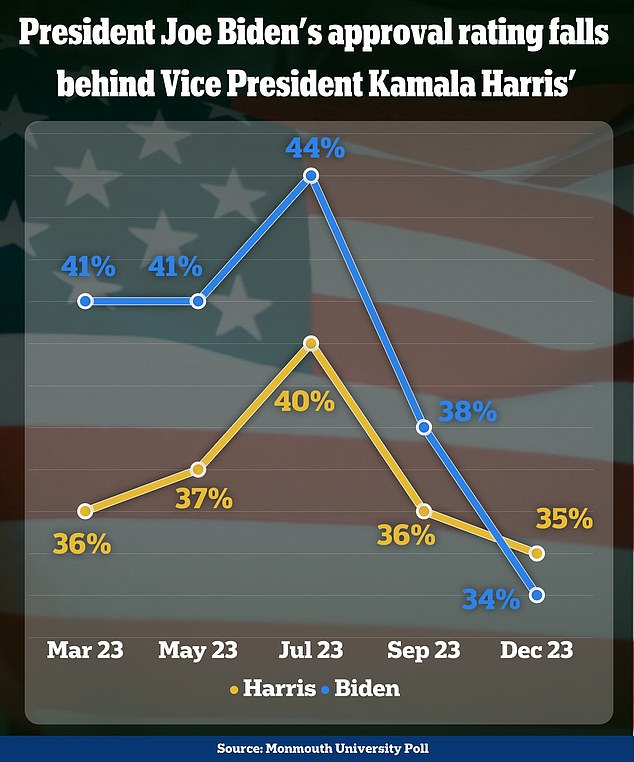Joe Biden sinks to be LESS popular than Kamala Harris as he plummets to a record low of 34 percent as vice president sits at 35 percent approval: President upset by numbers and demands explanation from staff
- President Joe Biden's approval rating has lagged behind that of Vice President Kamala Harris, a new Monmouth poll shows
- Biden has a 34 percent approval rating, while Harris has 35 percent
- The new survey comes as The Washington Post reported that Biden had a stern talk with staff about his low approval ratings before Thanksgiving
President Joe Biden's approval rating has even lagged behind that of his chronically unpopular Vice President Kamala Harris, a new Monmouth poll shows.
In Monmouth's December survey only 34 percent of Americans approved of the job Biden is doing, while 35 percent said the same about Harris.
It's a low point for Biden in this particular survey, in which he had a high approval rating of 54 percent when he took office.
Now 61 percent of Americans say they disapprove of the job Biden is doing.
Biden in particular disapproves of his poll numbers and asked staff at a meeting last month what they were doing about it.


Vice President Kamala Harris's (left) approval rating is one point higher than President Joe Biden's (right) as the president has issued stern words to his staff as his numbers are in the gutter

December Monmouth University found that 34 percent of Americans approve of Biden's job, compared to 35 percent who approve of Harris. She is traditionally less popular than the president
The Washington Post reported this on Monday that Biden had gathered a small group of aides for a meeting at the White House residence ahead of his Thanksgiving trip to Nantucket.
He issued stern words to the group, saying his poll numbers were unacceptably low and demanding to know what White House officials and his campaign team were doing about it.
The president and first lady Jill Biden have expressed frustration over Biden's low approval ratings for months, but have grown angry in recent weeks because the numbers have not changed.
Even though the president has touted “Bidenomics” and economic numbers have improved since the COVID-19 pandemic, a downturn Biden inherited from former President Donald Trump, poll after poll shows Americans are still frustrated and not giving him credit for incremental improvements.
“The Biden administration continues to tout their infrastructure investments and a host of positive economic indicators. That data may be factual, but most Americans are still suffering from the higher prices caused by post-pandemic inflation,” said Patrick Murray, director of the Monmouth University Polling Institute. “This seems to be driving public opinion.”
When we dug into the numbers, Biden was rated the worst by Americans on immigration and inflation in December.
Sixty-nine percent of respondents disapproved of Biden's handling of immigration, while 68 percent said they disapproved of his handling of inflation.
Currently, 44 percent of Americans say they are struggling to stay where they are financially.
That number was around 26 percent during the COVID-19 pandemic in 2020 and stood at 24 percent in June 2021.
Inflation rose to 42 percent, while inflation peaked at around 9 percent in June 2022, but fell to 37 percent in October 2022.
And while inflation has slowly improved, the number of Americans reporting they were in financial trouble began to rise again, reaching 41 percent in March and then 44 percent in December.
“There is political danger in spreading a message that essentially tells people that their view of their own situation is wrong,” Murray also warned.
Furthermore, only 31 percent of Americans said Biden has paid enough attention to the issues most important to their families.
The Monmouth University survey was conducted by telephone from November 30 to December 4 and surveyed 803 American adults.
The margin of error was plus or minus 4.8 percent.
